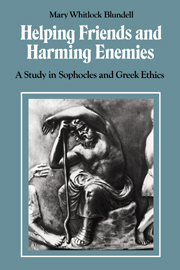Summary
He who accepts benefits, and denies a return of them when needed, inflicts a real hurt, by disappointing one of the most natural and reasonable of expectations, and one which he must at least tacitly have encouraged, otherwise the benefits would seldom have been conferred. The important rank, among human evils and wrongs, of the disappointment of expectation, is shown in the fact that it constitutes the principal criminality of two such highly immoral acts as a breach of friendship and a breach of promise. Few hurts which human beings can sustain are greater, and none wound more, than when that on which they habitually and with full assurance relied, fails them in the hour of need; and few wrongs are greater than this mere withholding of good; none excite more resentment, either in the person suffering, or in a sympathising spectator.
J. S. Mill, UtilitarianismAjax and his enemies
The opening lines of Ajax are spoken by the goddess Athena, who addresses her favourite, Odysseus, as an adherent of Harm Enemies: he is tracking down an enemy as usual, in a manner worthy of his traditionally tricky persona (1–8). She is the dearest of gods to him, and they enjoy a solidarity inherited from the Odyssey (14–19). He places himself in her hands, as he has always done in the past (34f.). But despite the bond between them, a conflict of values emerges.
- Type
- Chapter
- Information
- Helping Friends and Harming EnemiesA Study in Sophocles and Greek Ethics, pp. 60 - 105Publisher: Cambridge University PressPrint publication year: 1989



